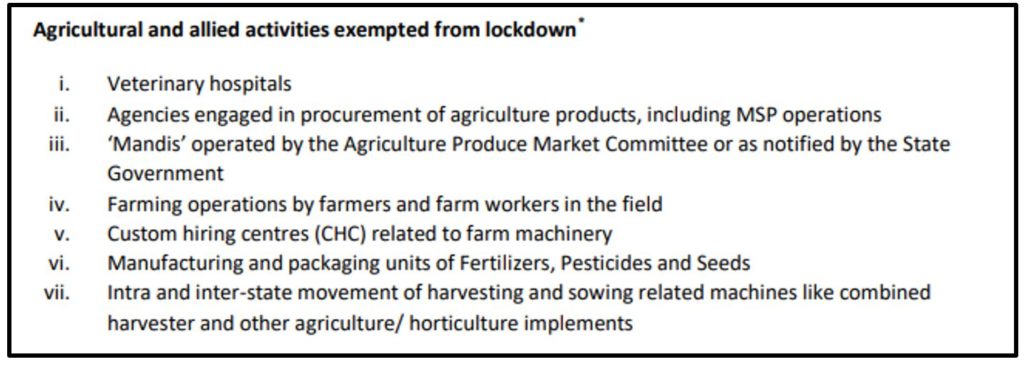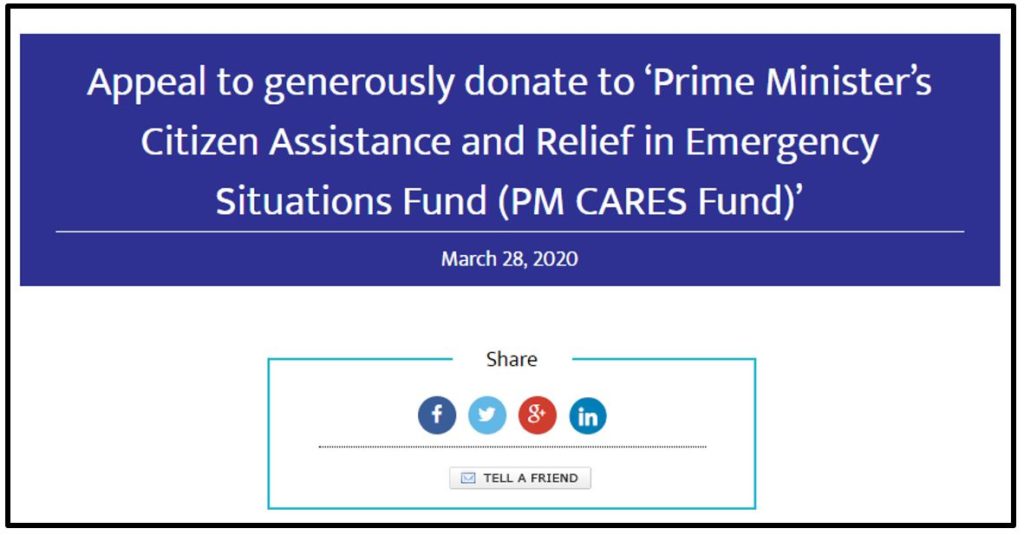The Central & State governments have undertaken multiple measures to provide relief for those affected by COVID-19. Here is a brief summary of all the measures by the Central Government.
The global pandemic of COVID-19 has posed a serious challenge to most countries in terms of managing the outbreak and reducing its impact on people. On one hand, economic activities in most countries, including India have reduced following nation-wide lockdowns. This has resulted in many people losing out on their incomes, like in the case of migrant workers and daily wage labourers as non – essential services have come to a standstill. On the other hand, the IMF has predicted a global recession worse than 2008, calling this period ‘humanity’s darkest hour’ since societies and economies have halted temporarily.
Globally, SARS-CoV-2, the virus responsible for COVID-19 has claimed more than 65,000 lives and affected more than 12 lakh people across 209 countries, according to WHO’s dashboard. Meanwhile, in India, more than 4000 cases and 100 deaths have been reported.

In an earlier story by Factly, the relief measures announced by state governments were listed in various sectors. Similarly, in this story, we look at some of the major announcements and relief measures announced by the central government to confront the pandemic, across some major sectors. Some of these measures, especially with respect to health, are bound to change depending on the dynamic situation.
Agriculture
- Certain operations in the farming sector and its allied sectors have been excluded from the lockdown measures as the harvesting and sowing season is currently in progress. However, it is advised that social distancing is maintained during agricultural activities. Some operations exempted from lockdown are farming activities by farmers and workers, veterinary services, manufacturing of fertilisers, pesticides, and seeds, and movement of agricultural machinery as on 28 March 2020. The government has issued safety precautions and guidelines for the activities to take place, such as social distancing, reduced number of persons, personal hygiene, etc.

- Agricultural Ministry has launched new features in e-NAM software in order to decongest mandis. The pan-India electronic trading portal links mandis across states and currently, efforts are being made to increase the number of mandis in the network from 585 to 1,000.
- Repayment date of crop loans has also been extended up to 31 May 2020 i.e. those who pay by 31 May 2020 will still get the benefit of Interest Subvention (IS) and Prompt Repayment Incentive (PRI).
Organised sector
- Employees who are ‘Persons with Disability’ have been exempted by the government from attending to essential services. As a preventive measure, to reduce the number of persons in office, staff will be present in shifts in all essential service offices.
- Insurance cover of Rs. 50 lakh has been extended to all healthcare providers fighting COVID-19 under Pradhan Mantri Garib Kalyan Package.
- Contractual employees in Indian Railways such as those engaged in AC in trains, Pantry cars, etc., will be considered on duty and paid accordingly following the suspension of train services.
- Government has asked companies to refrain from lay-offs and salary cuts.
- Income Tax department has extended deadline for filing 15G and 15H forms to 30 June 2020 for individuals facing TDS deductions by banks.
Migrant workers and unorganized sector
- Directions have been given to state governments to provide temporary shelter with clean water and sanitation and provision for food. The State Disaster Response Fund can be used for this purpose.
- Payment of wages to workers without any deduction is mandatory
- Landlords should not demand one month’s rent from the workers
- Guidelines to deal with psychosocial issues of migrant workers amidst the lockdown due to pandemic have been issued by government.
- Rs.52,000 crore cess fund available is to be used by State governments to help Building & Construction workers
Food security
- Under Pradhan Mantri Garib Kalyan Anna Yojana, all the beneficiaries under TPDS will be provided with 5 kgs of food grains per person per month for free for three months from April to June 2020.
Financial Aid
- ‘Prime Minister’s Citizen Assistance and Relief in Emergency Situations Fund (PM CARES Fund)’ has been launched by the government to collect funds to tackle COVID-19 challenges. However, questions have been raised as to what purpose this fund serves while Prime Minister National Relief Fund already exists. Contributions made to the fund in addition to expenditure on COVID-19 relief measures taken up by companies will be a part of Corporate Social Responsibility. Foreign inward remittances are also permitted as contributions to the fund.

- Rs. 11,902 crores released under State Disaster Risk Management Fund to all states.
- 20 crore women Jan Dhan account holders to get Rs 500 per month for next three months
- Increase in MNREGA wage to Rs. 202 a day from Rs. 182
- An ex-gratia of Rs. 1,000 to 3 crore poor senior citizen, poor widows and poor disabled
- Government to front-load Rs. 2,000 paid to farmers in first week of April under existing PM Kisan Yojana
Financial services
- A moratorium of three months on EMIs for outstanding loans was announced by RBI.
- For insurance premiums falling due in March and April 2020, a grace period of 30 days will be provided.
- Extension of last date of filing of original as well as revised income-tax returns for financial year 2018-19 to 30 June 2020.
- Extension of Aadhaar-PAN linking date to 30 June 2020.
- The date for making various investment/payment for claiming deduction has been extended to 30 June 2020. Hence the investment/payment can be made up to 30 June 2020 for claiming the deduction under these sections for 2019-20.
- Extension of date for filing GST returns and waiver of interest for certain companies.
Education
- Education department has asked Central Board of Secondary Education to promote students of Classes I to VIII to the next class.
- MHRD has recommended the board to conduct exams only in 29 crucial subjects for classes X and XII which are required for promotion. Exams to be held in March have been postponed.
- Class IX and XI students will be promoted based on school-based assessments such as tests, exams and projects.
- UGC and MHRD have opened up digital platforms for students and teachers to access and learn more.
Essential goods and services
- Masks, sanitisers, alcohol required for producing sanitisers, etc. have been classified as essential goods. Restrictions on ethanol production have been removed. Price of masks and sanitisers have been capped.
- To ensure availability of essential commodities across states, government has asked all states to lift food grain supplies of six months and pass them onto retailers so that consumers can stock at home. Prices of commodities are also monitored constantly under the Essential Commodities Act.
- The government has listed down essential services which will be functioning at the time of lockdown. The list can be accessed here.
Health
- The Ministry of Health & Family Welfare (MoHFW) and ICMR have been modifying the guidelines regarding patients- testing, diagnosis, and treatment. Factly’s earlier story throws light on the procedures. The government has also issued guidelines on how to contain large outbreak.
- The government has issued advisory to start using rapid antibody based blood test for COVID-19.
- Government launched ‘Arogya Setu’ mobile application which helps track the spread of the virus. It notifies users on whether they are susceptible to the infection.

- In addition to healthcare measures to tackle COVID-19, government has also issued measures to deal with alcohol withdrawal, and measures to ensure mental health of children, migrant labourers, and the elderly.
Other measures taken by the government
- The highly controversial National Population Register and Census have been postponed by the government.
- Validity of vehicle related documents such as fitness certificates, Registration Certificates, Driving License, etc. which expire between 01 February 2020 and 30 June 2020 will be considered valid up to 30 June 2020. Similarly, validity of environmental clearances have also been extended till 30 June 2020.
- A lot of fake news and misinformation are being circulated on social media pertaining to COVID-19. To curb this, the government as per the orders of Supreme Court, has asked state governments and UTs to create a mechanism to deal with the problem. Press Information Bureau has started a separate section for fact checking.
- Violation of lockdown measures will result in penal charges under IPC as per the Disaster Management Act.
In this story, only some of the major orders of the Central government with respect to COVID-19 have been discussed. PRS India and COVID India- Measures & GOs websites have presented the consolidated version of all the orders to date.


